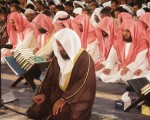I say praying 5 times a day is mind (human-ene
Post# of 52113

I say praying 5 times a day is
mind (human-energy} control.
!!!!!!!!!
OMGoodness - look at this shit:
How to Pray in Islam.
Prayer (salah; plural salawat) is one of the five pillars of Islam. It is incumbent upon all mature Muslims, and highly recommended for children aged ten and over, to complete their five daily prayers according to the method described here in order for them to be valid. It is believed that communication with Allah will bring life to the prayerful and bring them courage. Muslims believe that Allah speaks to us through the Qur'an, and salaah is our means of responding. Whether you're just curious as to how Muslims pray or if you're looking to learn for yourself, it's never too early to start.

1
Ensure the area is clean and free of impurities. This includes your body, your clothes, and the place of prayer itself.
Perform wudu. You must be ritually pure before you go start praying. If you're not, it's required to perform Wudu before you do. If since your last prayer, you have urinated, defecated, passed gas, bled excessively, or fallen asleep while leaning against something, you need to perform wudu[1]
If you are praying in a masjid (mosque), which is highly encouraged for men, enter quietly--other fellow Muslims might still be praying and you don't want to disturb them. Stand in a free space away from the entrance/exit.
If you are unsure of the cleanliness of your area, spread a mat or cloth on the floor for good measure. This mat (or prayer rug) is very important to Islamic culture.

2
Perform ghusl (full shower) if needed. Certain circumstances will require that you perform ghusl instead of wudu to be cleansed after removing najas (impurities) and before praying. If you wish to pray after having sexual intercourse, ending your menstruation period or postpartum bleeding, giving birth, or ejaculating, you need to perform ghusl. [2]
To perform ghusl, you must wash your entire body and hair with water. It is recommended that you wash 3 times.
Note that when you perform either wudu or ghusl, anything that prevents water from touching the obligatory areas of the body must be removed, including things such as nail polish, accessories, and waterproof mascara.[3]

3
Perform tayammum (dry purification) if needed. If a Muslim is unable to use water, he or she may choose to perform tayammum instead of wudu or ghusl. This rite involves using clean soil or dirt that has not been used before to perform tayammum.[4]

4
Face the Qibla. This is the direction all Muslims face to turn in prayer towards the Holy Ka'bah. The Holy Mosque in Mecca is the most revered place of worship for Muslims around the entire world. All Muslims are required to face the Ka'bah five times every day when offering their prayers.

5
Pray at the proper time. The five prayers of each day take place at very specific times.[5] For each one, there is a brief period of time it can be performed, determined by the rising and falling of the sun. Each salah takes about 5 to 10 minutes from start to finish, but should never be hurried.
The five prayers are Fajr, Zuhr, Asr, Maghrib and Isha. They are at dawn, immediately after noon, in the mid-afternoon, at sunset, and at night, respectively. They are not at the same time each day, as they are timed by the sun, which changes path throughout the seasons.
These are the amount of rak'ah (units) for each of the 5 salah:
Fajr - Two rak'ah sunnah mu'akkadah, then two rak'ah fardh;
Zuhr - Four rak'ah sunnah mu'akkadah, then four rak'ah fardh, then two rak'ah sunnah mu'akkdah, then two rak'ah nafl;
Asr - Four rak'ah sunnah ghayr mu'akkadah, then four rak'ah fardh;
Maghrib - Three rak'ah fardh, then two rak'ah sunnah mu'akkadah, then two rak'ah nafl;
Isha - Four rak'ah sunnah, then four rak'ah fardh, then two rak'ah sunnah mu'akkadah, then two rak'ah nafl, then three rak'ah witr, then two rak'ah nafl.
6
Learn to say prayers in Arabic. Salah must be performed in the Arabic language because this is the language that the Qur’an was revealed in. It also allows Muslims outside of Arabic-speaking countries to recite the prayers and understand what is being said. Speaking all prayers in the same language avoids the confusion of translating words into other languages.[6]

Use online sources to help you pronounce the obligatory prayer words, such as Rosetta Stone[7], Salaam Arabic[8], hosted by Pangaea Learning, Madinah Arabic[9] or Youtube[10] sources.
Take a course in Arabic at your local college.
Learn and practice the correct pronunciations with an Arabic speaker.

7
Cover yourself. Men and women must both cover themselves with material that covers the skin throughout the prayer. While women must cover everything but their faces and hands, men must keep the area between their navel and knees covered.[11]
The material must cover the body during prayer movements. So if, for example, bending causes a piece of material to slip and expose skin on a woman’s neck, she would need to ensure that her clothing is tucked in properly or put more clothing on before she can complete her prayer.
There is a part two below this information.
Including saying "Allahu Akbar"

Finish the prayer with tasleem. After the tashahhud, durood, and any du'a you wish to recite, end the prayer by:
Turning your head to the right and saying, As-salamu alaykum wa Rahmatullahi wa Barakaatuhu. The angel who records your good deeds is to this side.
Turning your head to the left and saying, As-salamu alaykum wa Rahmatullahi wa Barakaatuhu. The angel who records your wrongful deeds is to this side. The prayers have ended!
Another variation of the tasleem is by saying As-salamu alaykum wa Rahmatullah
 (0)
(0) (0)
(0)